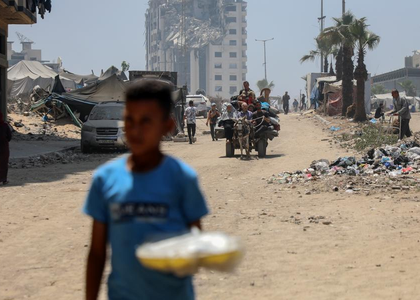Gazans burn plastic waste to cook in makeshift shelters
By IANS | Updated: June 26, 2025 11:53 IST2025-06-26T11:47:23+5:302025-06-26T11:53:51+5:30
United Nations, June 25 Civilians in Gaza face another deadly hazard, alongside hunger, gunfire, and bombardment -- burning ...

Gazans burn plastic waste to cook in makeshift shelters
United Nations, June 25 Civilians in Gaza face another deadly hazard, alongside hunger, gunfire, and bombardment -- burning plastic waste just for cooking, UN humanitarians said.
The UN Office for the Coordination of Humanitarian Affairs (OCHA) in a report on Wednesday stated, "Shelling and bombing across the (Gaza) Strip continue to have a devastating impact on civilians, reportedly killing and injuring scores of people, many of whom were seeking aid."
"Partners report that in the absence of fuel, cooking gas, and electricity, people are burning plastic waste."
OCHA said that when such fires occur in makeshift shelters or tents, poor ventilation poses tremendous safety and health risks to vulnerable family members, including children and older individuals, reports Xinhua news agency.
The Red Cross Field Hospital in Rafah received a mass casualty influx of 149 cases, as reported by the International Committee of the Red Cross (ICRC), on Tuesday.
"All responsive patients reported they were wounded while on their way to an aid distribution site," the ICRC said.
"Sixteen people were declared dead on arrival, and three more died of their wounds shortly after. The vast majority of patients reportedly suffered gunshot injuries."
The casualties among food-seeking Gazans usually occur at distribution centers of the non-UN, US-operated, and Israeli-approved militarised Gaza Humanitarian Foundation.
The ICRC reported that it had to activate its mass casualty procedures 20 times since May 27, adding, "The scale and frequency of these incidents is an alarming testament to the intolerable dangers civilians face as they attempt to access assistance."
The UN Population Fund reported that 80 percent of critical care units, including those used for childbirth, are at a risk of shutting down, when there is a daily average of 130 births in Gaza.
The humanitarian office said that community kitchens were able to prepare more than 200,000 meals every day this week. However, compared with the over 1 million meals distributed daily at the end of April, it represents a reduction of about 80 percent, a trickle offered to people on the brink of famine.
"To facilitate the orderly distribution of aid, supplies must be channeled daily through multiple crossings and land routes simultaneously, thereby ensuring people that the flow of essential support is steady, sufficient, and reliable," the Office said.
OCHA also reported that the world body and its partners attempted to coordinate 15 humanitarian movements inside Gaza on Tuesday, but only four were fully facilitated by the Israeli authorities. Seven other attempts were denied outright, preventing teams from trucking water, retrieving broken trucks, or repairing roads.
According to the Office, three other missions were initially approved, which later impeded on the ground, although one was ultimately accomplished on Wednesday. Another mission had to be canceled by the organisers.
OCHA said tens of thousands of students were unable to sit for this year's general secondary examination, which was due this week, because of insecurity, displacement orders, and internet connectivity challenges across Gaza. Last year, about 39,000 high school students in Gaza were reportedly unable to sit for the exam.
Disclaimer: This post has been auto-published from an agency feed without any modifications to the text and has not been reviewed by an editor
Open in app